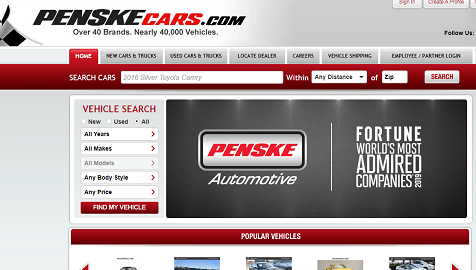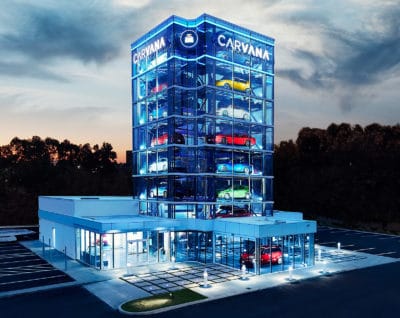In the early 1900s, cars forever changed personal transportation. And ever since, auto dealers have sold them the same way—in showrooms staffed by salespeople to consumers who walk in the front door. In 2019, that dynamic is changing.
Like apparel merchants, booksellers and even grocery stores, car dealers face consumers who expect the conveniences of shopping online. Eager to attract digital consumers, car dealers say it’s imperative to offer online capabilities that make it easier and less stressful to buy a vehicle. Meanwhile, online used-car sellers are pushing the limits of online car retailing.
However, because of the complexity and cost of auto purchases, automotive ecommerce is different from other sectors. Traditional car dealers say getting ecommerce right doesn’t mean becoming the Amazon of cars. It starts with giving consumers as much or as little online capability as they want.
“Ninety percent of car buyers still want to see, touch and drive a car before they buy it,” Wiebelhaus says. “Our focus with ecommerce is enabling buyers to do as much pre-sale work as they can—so when they walk into a dealership, they are ready to transact.”
He says Suburban Collection’s goal is to provide the tools car buyers need to put together a “virtual offer.” For example, a car buyer will know what features they want, the price of the car, what their monthly payment will be and how much they need to put down to achieve their desired monthly payment.

PenskeCars.com offers users the ability to search for new and used vehicles and locate dealers with the vehicles they want.
Other dealers take the same approach. Like most car dealers, Penske Automotive Group—the country’s second-largest franchised, new-car auto dealership group and one of six publicly traded auto retailers—does not allow customers to buy vehicles entirely online. But it offers an array of online tools on individual dealerships at PenskeCars.com. The tools allow consumers to research cars, research inventory and locate a Penske dealership that offers what they want to buy.
So far, the most potent advantage offered by the technology is its impact on customer satisfaction—particularly in terms of service after the sale, says Tony Pordon, executive vice president of investor relations and corporate business development at Penske. Text messaging, email and smartphone technology make it easy for service personnel to send updates to consumers—and even send them photos showing what kind of repairs are required.
Also joining the ecommerce game is CarMax Inc., the nation’s largest dedicated used-car retailer. Since late 2018, CarMax has been rolling out a “new personalized car buying experience” in markets across the country.
CarMax’s new buying concept allows consumers to complete the entire car-buying experience from home and have the car delivered. To make that possible, CarMax is in the process of opening three “customer experience centers” to assist customers over the phone or online with shopping, comparing financing options and other questions.
Classified ads shift online
Auto dealers also use numerous auto sites that offer updated versions of classified car-for-sale ads and allow anyone to list a vehicle for sale. Possibly the oldest car marketplace is eBay Motors, operated by eBay Inc. and launched almost 20 years ago. Similar online marketplaces include well-known players such as Autotrader, Edmunds.com, Cargurus, Cars.com and KBB.com (operated by Kelley Blue Book Co.). Some online marketplaces specialize in listing vehicles on behalf of car dealerships only. These include websites operated by TrueCar, CarsDirect and Joydrive.
Car shoppers can use the sites to reach out directly to sellers to ask questions, make offers and check availability. In the case of used cars, consumers can often check vehicle history reports. Buying requires contacting the seller and working out a deal.
Online automotive retailers

A Carvana car vending machine in Oklahoma City, opened in September 2019.
A new breed of companies that sell used cars online is reshaping automotive retailing. Such retailers offer the chance to browse cars online and—when they are ready—complete nearly the entire transaction online. This approach works in the used-car market because, unlike new-car dealers, such online sellers are not required to open franchised dealerships. Such dealerships typically include showrooms and service departments that meet manufacturers’ requirements.
One of those online retailers is Carvana. Launched in late 2013, Carvana is an online used-car retailer that sells used cars directly to consumers. Carvana acquires vehicles through auctions, customer trade-ins and purchases of vehicles from car rental and leasing companies.
Carvana is probably best known for its 22 “vending machines”—multi-story, glass towers where consumers can pick up their cars using a special coin that Carvana provides buyers who choose this delivery option. The most recent vending machine, opened in Oklahoma City in September 2019, stands eight stories high and holds 27 vehicles.
Other online dealers with similar strategies (but no vending machines) include Shift Technologies and Vroom Inc.
Nobody expects car buying to move entirely online. Observers nonetheless expect ecommerce to become a larger and larger part of buying a car. Like other kinds of merchants, car retailers will have to adapt to new technology and emerging online competitors if they want to keep up with an evolving marketplace.
Findlay Automotive Group, a group of 36 dealerships across six Western states, says it has more cars listed on Joydrive than any other dealership group—more than 8,200 as of October 2019. Why? Because if Findlay does not reach out to online buyers, somebody else will.
“We see it as a way to combat other online marketplace platforms like Carvana,” says Tyler Corder, chief financial officer of Findlay Automotive. Joydrive started in the Northwest and has been expanding, and Corder thinks it will eventually attract dealers nationwide.
The 2019 Automotive Ecommerce Report is available as a downloadable PDF for $299. It’s also included in our Gold and Platinum Memberships, which provide access to all Digital Commerce 360 research reports and certain online retailer databases.
Favorite